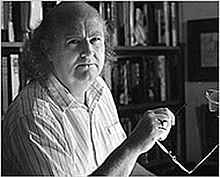|
Martin Booth
Martin Booth (7 September 1944 – 12 February 2004) was an English novelist and poet. He also worked as a teacher and screenwriter, and was the founder of the Sceptre Press. Early lifeMartin Booth was born in Lancashire England,[citation needed] the son of Joyce and Ken Booth, the latter of which was a Royal Navy civil servant.[1] Martin has said that his parents had a difficult marriage, as his father was stern, pompous, and humourless, while his mother was adventurous, witty, and sociable.[1] The family moved to Hong Kong in May 1952, where his father was stationed for a three-year tour as a grocery supplier to the British Navy.[1][2] In his memoir “Gweilo: A memoir of a Hong Kong Childhood” Booth recalls that the streets of Hong Kong were safe, and he would explore the city alone as a child.[1] He encountered things he was unfamiliar with: dogs hung in a butcher shop, an impoverished family living in a packing crate, and a Russian refugee who claimed to be the missing Russian princess Anastasia.[1] People would touch his blond hair for good luck.[1] He and his mother also learned Cantonese.[2] He attended Kowloon Junior School, the Peak School, then King George V School, and left in 1964. From 1965 to 1968 he attended Trent Park College of Education in Cockfosters, North London, part of what is now Middlesex University. His main subject was science, and he obtained the Certificate of Education. CareerIn England, Booth worked as a truck driver, legal clerk, wine steward, and English teacher (in Rushden).[3][4] He also taught English at Castle School, Taunton. In 1974 Booth was Poetry Editor of Fuller d'Arch Smith, founded by Timothy d'Arch Smith and Jean Overton Fuller. He had recently bought a house in Knotting in North Bedfordshire, and was instrumental in finding Fuller a house in Wymington which also became the registered office of the company.[4] Booth first made his name as a poet and as a publisher by producing elegant volumes by British and American poets, including slim volumes of work by Sylvia Plath and Ted Hughes. His own books of verse include The Knotting Sequence (1977), featuring the character Cnot who founded the hamlet Knotting.[5] The book was named for the village in which Booth was living at the time.[citation needed] The book features a series of lyrics in which he seeks links between the present and the Saxon past, and the man called Knot who gave his name to the village. Booth also accumulated a library of contemporary verse, which allowed him to produce anthologies and lectures. In the late 1970s Booth turned mainly to writing fiction. His first successful novel, Hiroshima Joe, was published in 1985. The book is based on what he heard from a man he met as a boy in Hong Kong and contains passages set in that city during the Second World War. Booth was a veteran traveller who retained an enthusiasm for flying, also expressed in his poems, such as "Kent Says" and In Killing the Moscs. His interest in observing and studying wildlife resulted in a book about Jim Corbett, a big-game hunter and expert on man-eating tigers. Many of Booth's works were linked to the British imperial past in China, Hong Kong and Central Asia. Booth was also fond of the United States, where he had many poet friends, and of Italy, which features in many of his later poems and in his novel A Very Private Gentleman (1990). Booth's novel Industry of Souls was shortlisted for the 1998 Booker Prize.[6]
Booth died of cancer in Devon[7] in 2004, shortly after completing Gweilo, a memoir of his Hong Kong childhood written for his own children.[1] The 2010 film The American, starring George Clooney, was based on his novel A Very Private Gentleman.[8] Three Booth's novels have been translated into French : Gweilo, Music on the Bamboo Radio and The American.[9] WorksPoetry
Fiction
Nonfiction
Works translated into French
References
External links |
||||||||||||
